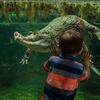Two of London Zoo's smallest primates had a very special trip to the dentist as the Zoo’s vets, alongside a team of dental specialists, worked to keep the health of their residents in top form.
Five-year-old Endangered pygmy slow loris Ernest and black-capped squirrel monkey Nuka were brought into the conservation zoo’s vet hospital for dental operations, after previous checkups had identified potential gum infections.
London Zoo’s vets called upon Dr. Rachel Perry, European Veterinary Specialist and Royal College of Veterinary Surgeons Specialist in veterinary dentistry, to help ensure their little patient got the very best in dental expertise.
Ernest and Nuka were each given a general anesthetic for their dental exams, which allowed vets to also carry out a full health check on the pygmy slow loris and squirrel monkey while the dentists worked.
After an x-ray and thorough examination, vets got to the root of the problem: a troublesome broken tooth had been lurking beneath Ernest’s gum, causing the swelling, while vets discovered that two of Nuka’s teeth – a canine and incisor – needed extracting.
Dr. Perry and her team swiftly removed the problematic teeth and closed the primates’ tiny gums with the smallest of stitches, and brought them around from anaesthesia and returned Ernest and Nuka to their keepers.
London Zoo veterinarian Stefan Saverimuttu said, “Ernest and Nuka were star patients. Both of their dental operations went really well. Ernest is doing much better now that the troublesome tooth has been removed.
“Nuka was a bit wobbly after his anaesthesia, but within minutes, he was back to his usual antics. He’s been opting for softer foods while his mouth heals, which isn’t too much of a hardship for him — he’s always had a soft spot for banana.”
“Now he’s feeling better, Ernest was able to go into a new part of his habitat at the Zoo to join a new mate. The two have been given a breeding recommendation, which means they can hopefully play a vital role in the European breeding programme to support this Endangered species.”
Both animals have started a course of anti-inflammatory medicine after their procedures and are being closely monitored by their keepers and vets.
Families can learn more about the expert care given by London Zoo’s team of veterinarians this February half term at Vets in Action – a week of fun, allowing kids to try their hand at being a vet and treating on soft toy animals, while learning about the care given to animals rescued from the illegal wildlife trade. Find out more and book tickets to secure your visit here: www.londonzoo.org/vetsinaction
Related Members
-
News
 Amid rising costs, zoos are more relevant than ever… 3rd February, 2026It will come as no surprise to anyone working in the zoo sector that Britain and Ireland’s beloved zoos are facing challenges amidst a…
Amid rising costs, zoos are more relevant than ever… 3rd February, 2026It will come as no surprise to anyone working in the zoo sector that Britain and Ireland’s beloved zoos are facing challenges amidst a… -
News
.png?w=100&h=100&zc=1&f=jpeg&hash=aed4c6409e0441a61f3e1146ef560d83) Blog: Supporting Otter Conservation at Colchester Zoological Society 30th January, 2026Rebecca Moore (Zoological Director, Colchester Zoological Society) describes the charity's role in taking a global approach on the conservation…
Blog: Supporting Otter Conservation at Colchester Zoological Society 30th January, 2026Rebecca Moore (Zoological Director, Colchester Zoological Society) describes the charity's role in taking a global approach on the conservation… -
News
.png?w=100&h=100&zc=1&f=jpeg&hash=d2375a1baa7e4f03a56c766485cce667) Keepers Witness Birth of First Baby of 2026 at Safari Park 30th January, 2026A rare behind-the-scenes moment unfolded at West Midlands Safari Park as a giraffe gave birth to the Park’s first baby of 2026, with keepers there…
Keepers Witness Birth of First Baby of 2026 at Safari Park 30th January, 2026A rare behind-the-scenes moment unfolded at West Midlands Safari Park as a giraffe gave birth to the Park’s first baby of 2026, with keepers there…

.png?w=100&h=50&zc=1&f=jpeg&hash=6072ef9d48edbf6f934fead3300c5243)

